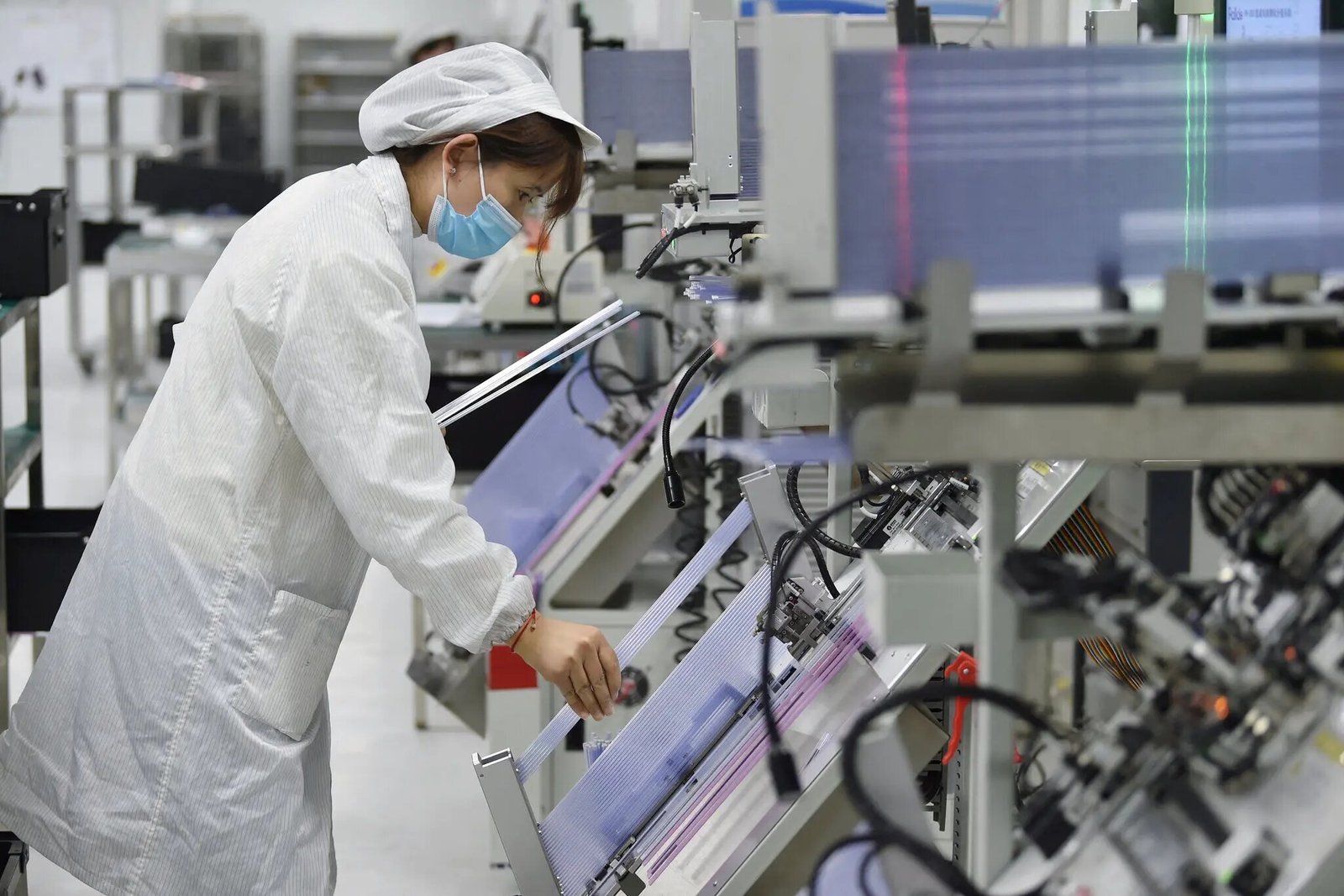Business
Lawmakers Discover That US Companies Spent $1 Billion on Chinese Chips
Published
2 years agoon

Five American venture capital firms have spent more than $1 billion in China’s chip industry since 2001, according to a congressional probe. This has fueled the expansion of a sector that the US government now views as a national security concern.
More than 150 Chinese companies received funding from the five firms—GGV Capital, GSR Ventures, Qualcomm Ventures, Sequoia Capital, and Walden International—according to a report released on Thursday by the House Select Committee on the Chinese Communist Party, which included both Democratic and Republican members.
Approximately $180 million of the investments went to Chinese companies that, according to the committee, either directly or indirectly backed Beijing’s armed forces. The U.S. government has stated that certain corporations, such as Semiconductor Manufacturing International Corporation (SMIC), China’s largest chipmaker, supply chips for China’s military research, equipment, and weaponry.
The House committee’s report centers on investments made prior to the Biden administration enacting broad regulations meant to prevent China from receiving finance from the United States. It makes no accusations of illegality.
The Biden administration prohibited American venture capital and private equity firms from making investments in Chinese sophisticated semiconductors, artificial intelligence, and quantum computing in August. Additionally, it has placed global restrictions on the supply of sophisticated semiconductors and chip-making equipment to China, claiming that such technologies could enhance the capabilities of China’s intelligence services and armed forces.
The group, which was founded a year ago, has advocated for more tariffs on China, criticized Ford Motor and other companies for doing business with Chinese firms, and brought attention to issues with forced labor involving Chinese e-commerce sites.
The report proposed that Congress limit investments in parent firms and subsidiaries of all Chinese entities that are listed as federal “red flag” entities or that are subject to specific trade restrictions in the United States. This would include businesses that have connections to forced labor in China’s Xinjiang province or collaborate with the Chinese military. The ranking Democratic member of the committee, Representative Raja Krishnamoorthi of Illinois, stated that the federal government ought to think about enforcing regulations on other sectors of the economy, such as biotechnology and fintech.
Prior to the committee announcing its probe into private finance, Sequoia declared in June that it would rebrand its China division as HongShan and split it apart from its American operations. A few months later, GGV Capital announced that it will split off its company centered in Asia.
A request for comment from Walden was not answered. An official from GSR declined to provide a statement. GGV said that the report had complied with all relevant legislation and included a list of clarifications and revisions. Moreover, GGV is attempting to sell its interests in the three businesses covered in the report.
According to a representative for Sequoia, the company has always had procedures in place to guarantee adherence to US law and national security concerns. On December 31, the company completed its separation from HongShan.
According to a Qualcomm representative, the company’s investments accounted for less than 2 percent of the total investments covered in the report, making them modest in comparison to venture capital firms’ holdings.
Washington officials argue that China has attempted to use the private sector’s experience to modernize its military, making them view economic relationships—even with private Chinese technology companies—as worrisome.
The chairs of the committee acknowledged that a large number of these investments were made during a period when the US was pushing for increased trade with China.
“We all placed this wager on China’s assimilation into the world economy two decades prior, and it made sense,” the committee’s chairman, Wisconsin Representative Mike Gallagher, said. “It just so happened to not work out.” “Now, I just think there’s no excuse anymore,” he continued.
The 57-page report is based on interviews with senior executives at many corporations and information concerning investments that the firms gave the committee.
The committee’s findings examined a small portion of the money going to China. According to start-up funding tracker PitchBook, Chinese semiconductor businesses raised $8.7 billion in deals between 2016 and July 2023, with the participation of US investment firms. 2021 was the investment’s peak year.
For several decades, venture capital firms actively targeted worldwide expansion, with a particular focus on Asia. However, they have anticipated that investments in Chinese enterprises would come under more scrutiny ever since the Trump administration adopted a more assertive posture toward China.
An investor at the venture capital firm Kyber Knight, Linus Liang, stated, “Nobody is touching China now.”
The committee’s worries that American funding and technology will wind up in Chinese enterprises might not be allayed by breaking up investment entities with ties to China, as Sequoia and GGV did, the article said. Among its supporters are American investors in HongShan, the recently split Chinese company of Sequoia. Furthermore, the report stated that GGV Asia and HongShan could continue to invest in U.S. start-ups.
The corporation Walden International, based in California, is mostly the subject of the article. It was among the first and most significant foreign investors in the Chinese semiconductor industry. Lip-Bu Tan, a current board member of Intel and the former CEO of chip design company Cadence Design Systems, is in charge of Walden.
According to the article, Walden International collaborated with the Chinese government and state-owned enterprises in China, including a well-known military supplier, to establish a number of funds for the semiconductor industry.
It was one of the original investors and sources of funding for SMIC, which is currently bound by trade restrictions imposed by the United States due to its connections to the Chinese military.
He is recognized for providing SMIC and other businesses with capital, resources, and patents for chip design in addition to lucrative client relationships.
Although SMIC was designated as a “trusted customer” by the US government in 2007, doubts about the company’s operations have increased in Washington in more recent times. The business is now essential to China’s goals of developing a robust semiconductor industry and reducing its reliance on the US.
Tens of millions of dollars were invested in Advanced Micro-Fabrication Equipment, or AMEC, a Chinese business that manufactures the machinery required to fabricate semiconductors, by Walden and Qualcomm Ventures, the chipmaker Qualcomm’s investment arm. After the US imposed limitations on supplying China the most cutting-edge chip-making machinery, AMEC, a supplier to SMIC and other Chinese chipmakers, became essential to China’s efforts to expand its chip-making business.
The government of China provides substantial funding to its semiconductor industries. However, connections with American venture capital firms give Chinese businesses access to technology, the American and European markets, and managerial know-how. Additionally, American venture capital firms have attempted to influence American authorities and regulators in favor of Chinese enterprises that are part of their portfolio.
Sahil Sachdeva is the CEO of Level Up Holdings, a Personal Branding agency. He creates elite personal brands through social media growth and top tier press features.

You may like
Business
How to Get Featured in The Guardian: A Practical Guide to Earning National Media Coverage
Published
4 hours agoon
February 23, 2026
If you’re an entrepreneur, founder, author, or marketing professional, you’ve probably wondered how to Get Featured in The Guardian and other top-tier publications. National media coverage isn’t just about vanity—it builds credibility, drives traffic, attracts partnerships, and positions you as a trusted authority in your industry.
But landing coverage in a globally respected newspaper doesn’t happen by accident. It requires strategy, timing, and a strong understanding of what journalists actually want. In this guide, you’ll learn actionable steps you can take to dramatically improve your chances of securing meaningful press coverage.
Why Get Featured in The Guardian Matters for Your Brand
Securing a feature in a major publication instantly elevates your reputation. When you get quoted or profiled in a respected outlet, your audience perceives you differently. You’re no longer just promoting yourself—you’ve been validated by an independent and credible source.
Here’s why media coverage at this level is so powerful:
- Instant Credibility and Authority
Being associated with a trusted newspaper enhances your brand image overnight. Potential clients, investors, and partners are more likely to take you seriously.
- High-Quality Traffic
Online articles can drive thousands of readers to your website. Unlike paid ads, this traffic often converts better because it comes from trust-based exposure.
- Long-Term SEO Benefits
Media backlinks from authoritative domains significantly improve your search engine rankings. Over time, this strengthens your overall digital presence.
- Social Proof That Compounds
Once you’ve been featured, you can showcase it on your website, social media, sales pages, and email signatures—amplifying its impact for years.
When done strategically, the decision to pursue media coverage becomes a long-term brand investment, not just a publicity stunt.
Proven Strategies to Get Featured in The Guardian
If you want to Get Featured in The Guardian, you need more than a good product or service. Journalists are not looking for advertisements—they’re looking for compelling stories that resonate with their readers.
Here are proven strategies that increase your chances of success:
- Develop a Strong News Angle
Reporters care about what’s new, relevant, or timely. Ask yourself:
- Is there a trend you’re tapping into?
- Do you have data or research that supports a bigger narrative?
- Are you responding to a current issue or public debate?
A strong angle connects your expertise to a broader social, economic, or cultural conversation.
- Understand the Right Section
Before pitching, research where your story fits. Is it business, technology, lifestyle, opinion, or environment? Study recent articles in that section and look at:
- Writing tone
- Story structure
- Types of sources quoted
- Headline style
If you want to Get Featured in The Guardian, your pitch must feel like a natural extension of content they already publish.
- Craft a Personalized Pitch
Avoid mass emails. Journalists can spot generic pitches immediately.
A strong pitch should include:
- A compelling subject line
- A concise explanation of why the story matters now
- Supporting data or unique insights
- A short bio establishing credibility
Keep it clear and direct. Long-winded emails often get ignored.
- Offer Real Value, Not Promotion
One of the biggest mistakes people make is pitching themselves instead of pitching a story. Your goal is not to sell—it’s to inform, educate, or inspire readers.
Provide:
- Original research
- Contrarian viewpoints
- Expert commentary
- Case studies or personal experiences
Journalists are more likely to respond when they see genuine value for their audience.
- Build Relationships Before You Pitch
Engage with journalists on social media. Share their articles. Leave thoughtful comments. Show that you understand their work.
Relationship-building increases familiarity, and familiarity increases response rates.
Common Mistakes to Avoid When Trying to Get Featured in The Guardian
Even highly successful professionals struggle with media outreach because they make avoidable errors. If you’re serious about your PR strategy, watch out for these pitfalls.
- Making It All About You
Editors are focused on readers. If your pitch centers solely on your achievements, it’s unlikely to gain traction. Shift the narrative from “Look at me” to “Here’s why this matters.”
- Ignoring Timing
Timing can make or break your story. A pitch tied to a trending topic or current event has a much higher chance of being accepted.
For example, launching a sustainability initiative is more compelling if it aligns with global climate discussions or policy updates.
- Sending Attachments Without Context
Never attach large files without explanation. Instead, summarize your story in the email and offer additional materials upon request.
- Giving Up Too Soon
Media outreach is a numbers game. One rejection doesn’t mean your story isn’t strong. Sometimes it’s about timing, editorial calendars, or competing priorities.
Persistence—without being pushy—is key.
Long-Term Benefits When You Get Featured in The Guardian
The real power of media coverage unfolds over time. When you successfully Get Featured in The Guardian, the impact extends far beyond the initial publication date.
- Speaking Opportunities
Event organizers and conference hosts often look for speakers who have credible media exposure. A feature can open doors to keynote invitations and panel discussions.
- Partnership Requests
Brands prefer collaborating with businesses that have established authority. Media recognition signals trustworthiness and influence.
- Increased Investor Confidence
For startups, press coverage can improve investor perception. It demonstrates traction, relevance, and public interest.
- Enhanced Personal Brand
Whether you’re a founder or a thought leader, being featured strengthens your positioning. It separates you from competitors and builds long-term recognition.
Over time, one strong feature can lead to additional coverage in other publications, creating a ripple effect across your industry.
How to Strengthen Your Chances Even Further
While pitching directly can work, you can also improve your success rate through:
- Hiring a PR professional with media connections
- Publishing high-quality thought leadership on your own platform
- Building a strong LinkedIn presence
- Creating original research reports journalists can reference
Consistency matters. Media visibility is often the result of sustained effort rather than a single email.
Additionally, make sure your website and social channels are polished before pitching. If a journalist researches you, your digital presence should reinforce your credibility.
Final Thoughts: Turning Media Coverage into Momentum
Many professionals dream of national press coverage, but only a few approach it strategically. If your goal is to Get Featured in The Guardian, focus on delivering timely, relevant, and reader-centered stories rather than self-promotion.
Remember:
- Lead with value.
- Support your pitch with data.
- Personalize every outreach effort.
- Be patient and persistent.
Media success is rarely instant—but when it happens, it can transform your brand authority, search visibility, and growth trajectory.
Start by refining your story today. With the right angle and approach, your next email pitch could be the one that earns you a powerful and career-defining feature.
Business
Elevating Your Industry Authority: A Guide to Get Published in The Real Deal
Published
4 days agoon
February 19, 2026
In the high-stakes ecosystem of real estate, visibility is more than just a marketing metric—it is the ultimate form of professional currency. For developers, brokers, and PropTech innovators navigating the skylines of New York, Miami, or Los Angeles, there is one publication that serves as the definitive arbiter of success. It is the “Bible” of the trade, a journalistic powerhouse that dictates market sentiment and records the industry’s most pivotal moments. Naturally, for any ambitious professional, the ultimate milestone is to get published in The Real Deal.
However, landing a spot in these prestigious pages requires more than a standard press release. It demands a sophisticated understanding of the publication’s DNA and a commitment to providing high-level value to a discerning audience.
The Strategic Advantage to Get Published in The Real Deal
The Real Deal (TRD) is not a typical trade magazine; it is an investigative juggernaut that blends hard-hitting journalism with granular, data-driven insights. When you get published in The Real Deal, you aren’t just reaching a general audience; you are speaking directly to institutional investors, private equity titans, and the policymakers who shape urban development.
The benefits of a feature or a well-placed expert quote include:
- Institutional Credibility: A mention in TRD acts as a “seal of approval” from the industry’s most rigorous editors.
- Networking Leverage: High-profile features often lead to direct inquiries from potential partners and high-net-worth clients.
- SEO Dominance: TRD’s massive domain authority ensures that any mention of your name or firm will dominate search engine results for years to come.
Mastering the Editorial Pitch to Get Published in The Real Deal
Success in the media landscape is rarely accidental. To get published in The Real Deal, you must approach their editorial team with a “news-first” mindset. TRD reporters are famously diligent; they are not looking for promotional fluff or “advertorial” content. They are looking for the “why” behind the market trends.
- Lead with Proprietary Data
TRD has an insatiable appetite for numbers. Whether it is a breakdown of price-per-square-foot trends in a revitalizing neighborhood or an analysis of CMBS loan delinquencies, data is the fastest way to an editor’s heart. If you want to get published in The Real Deal, ensure your pitch is backed by unique research or a statistical angle that hasn’t been explored by competitors.
- Focus on “The Big Play”
While small residential closings are the lifeblood of many agencies, they rarely make the cut at TRD unless there is a celebrity angle or a record-shattering price point. Focus your outreach on large-scale acquisitions, significant legislative shifts, or innovative technological disruptions that have implications for the broader market.
Building Lasting Relationships to Get Published in The Real Deal
Publicity is a marathon, not a sprint. You don’t always need a massive “breaking news” story to start a dialogue with the editorial staff. Sometimes, the most effective way to get published in The Real Deal is to offer yourself as a reliable, objective source of information.
Pro Tip: Identify the specific “beat” reporters who cover your niche—be it retail, industrial, or luxury residential—and offer to provide “on-the-ground” context for stories they are already developing. By becoming a “source of record,” you increase the likelihood of being featured in future investigative deep dives.
Furthermore, pay close attention to the “Daily Dirt” and other TRD newsletters. Understanding what the editors are prioritizing on a daily basis allows you to align your personal or brand narrative with the current news cycle, making your contribution timely and indispensable.
Tailoring Your Narrative to Get Published in The Real Deal
Every publication has a specific “voice,” and TRD is known for being sharp, analytical, and occasionally irreverent. They excel at peeling back the curtain on the industry’s inner workings. If your goal is to get published in The Real Deal, avoid sterilized corporate jargon. Instead, offer a candid perspective on market challenges—such as the impact of fluctuating interest rates or the complexities of office-to-residential conversions.
The editorial team values three core pillars:
- Exclusivity: If you have a scoop, offering it to TRD first is a powerful incentive for coverage.
- Clarity: Get straight to the point of why your story matters to a national audience.
- Accuracy: In an era of misinformation, TRD prides itself on rigorous fact-checking. Ensuring your details are airtight is non-negotiable.
Final Thoughts
The path to media prominence in real estate is competitive, but for those who understand the nuances of the trade, it is entirely achievable. When you finally get published in The Real Deal, it marks a transition from being a mere participant in the market to being a leader of the global real estate conversation.
Business
Get Published in Mashable A Complete Guide to Securing High-Impact Tech Media Coverage
Published
5 days agoon
February 18, 2026
If your goal is to Get Published in Mashable, you’re aiming for one of the most recognized digital media platforms in the world. Known for covering technology, digital culture, startups, entertainment, and innovation, Mashable offers brands and entrepreneurs a powerful opportunity to gain global exposure. A feature here doesn’t just boost visibility—it strengthens credibility, builds authority, and positions you within influential digital conversations.
Whether you’re launching a startup, introducing new technology, or establishing yourself as a thought leader, understanding how to approach Mashable strategically can significantly increase your chances of success.
Why Mashable Is a Powerful Platform
Founded in 2005, Mashable has grown into a globally respected publication covering innovation, social media, business trends, gadgets, and cultural movements. Its audience includes tech enthusiasts, entrepreneurs, investors, and digitally connected consumers.
Being featured provides:
-
Global online visibility
-
Strong brand credibility
-
Enhanced investor confidence
-
Increased website traffic
-
SEO benefits from authoritative backlinks
Because Mashable focuses on digital innovation and cultural relevance, your story must offer real value—not just promotion.
What Mashable Editors Look For
Before pitching, it’s essential to understand the editorial mindset. Mashable prioritizes stories that are:
-
Innovative and forward-thinking
-
Data-driven or research-backed
-
Relevant to digital culture
-
Timely and newsworthy
-
Unique or disruptive
Editors receive countless pitches daily. To stand out, your story must provide a compelling angle that aligns with current trends or emerging technologies.
Step-by-Step Strategy to Get Published in Mashable
Securing coverage requires preparation and strategic positioning. Here’s how to approach the process effectively.
1. Develop a Newsworthy Angle
Mashable is not a promotional platform—it’s a news-driven publication. Ask yourself:
-
Is your product solving a major problem?
-
Does your startup offer a breakthrough innovation?
-
Is there data or research supporting your story?
-
Is your announcement tied to a trending topic?
Timing matters. Align your pitch with relevant industry developments to increase interest.
2. Build Credibility Before Pitching
Publications like Mashable are more likely to feature brands with existing traction. Strengthen your credibility by:
-
Gaining coverage in smaller media outlets
-
Growing your digital presence
-
Publishing thought leadership articles
-
Building an engaged online audience
Demonstrating authority and momentum makes your story more appealing.
3. Prepare a Compelling Media Kit
Your media kit should include:
-
A concise company overview
-
Founder bios
-
High-resolution images
-
Data or research highlights
-
Website and social media links
-
Previous press mentions
Professional presentation signals readiness for major media exposure.
4. Craft a Strong Pitch
When pitching, clarity and brevity are critical. Your email should:
-
Start with a compelling subject line
-
Introduce your story in one strong paragraph
-
Highlight why it matters now
-
Provide supporting data
-
Offer availability for interviews
Avoid exaggeration. Authenticity and factual accuracy are key to building trust with journalists.
5. Consider Strategic PR Support
Public relations professionals often have established relationships with media outlets. They understand editorial preferences and can position your story effectively. Working with experienced PR experts increases efficiency and improves your chances of securing meaningful placements.
Benefits of Getting Featured
When you successfully get published in Mashable, the impact can extend far beyond one article.
Increased Brand Authority
Being featured on a reputable tech platform elevates your credibility. Customers and investors view your brand as validated by a trusted media source.
Enhanced SEO Performance
High-authority backlinks from recognized publications can significantly improve search engine rankings.
Greater Investor and Partner Interest
Media validation often attracts venture capitalists, strategic partners, and collaboration opportunities.
Expanded Global Reach
Mashable’s international readership exposes your brand to audiences beyond your immediate market.
Common Mistakes to Avoid
Even strong brands can make errors when seeking media coverage.
Sending Generic Pitches
Mass emails lacking personalization are often ignored. Research the journalist’s recent articles and tailor your pitch accordingly.
Overly Promotional Language
Editors prioritize value for readers, not advertising copy. Focus on insight and impact.
Ignoring Timing
If your pitch isn’t tied to a relevant trend or news cycle, it may lack urgency.
Lack of Supporting Data
Claims without evidence reduce credibility. Provide measurable results, statistics, or proof points.
How to Strengthen Your Media Positioning
If you’re serious about securing coverage, adopt a long-term approach.
Establish Thought Leadership
Publish insightful content on LinkedIn, Medium, or industry blogs. Demonstrating expertise increases recognition.
Build Industry Relationships
Networking at tech events and conferences helps create media connections organically.
Leverage Social Proof
Customer testimonials, user growth numbers, and partnerships strengthen your brand story.
Stay Consistent
Media coverage often builds momentum. Each feature makes the next one easier to secure.
The Role of Timing in Media Success
Timing is one of the most overlooked factors in media outreach. Product launches, funding announcements, research studies, and industry events create natural news hooks. Aligning your pitch with these milestones significantly increases relevance.
Additionally, staying informed about current tech trends allows you to contribute expert commentary when journalists are seeking insights.
Beyond a Single Feature
While many brands focus on landing one high-profile placement, sustained media presence delivers stronger long-term benefits. Consistent storytelling across reputable platforms builds authority over time.
After a successful feature, amplify it across:
-
Social media channels
-
Email newsletters
-
Investor presentations
-
Website press sections
-
Marketing campaigns
This extends the value of your coverage and reinforces brand credibility.
Final Thoughts
To get published in Mashable is to position your brand at the forefront of digital innovation and cultural relevance. It requires strategic storytelling, newsworthy angles, professional presentation, and persistence. By focusing on authenticity, data-backed insights, and strong editorial alignment, you increase your chances of securing meaningful coverage. Media success doesn’t happen by chance—it’s built through preparation, credibility, and smart outreach.
Business
Get Published in Flaunt Magazine The Ultimate Guide to Elevating Your Brand
Published
5 days agoon
February 18, 2026
If you’re looking to Get Published in Flaunt Magazine, you’re aiming for more than just media coverage—you’re pursuing cultural credibility. Flaunt is known for blending fashion, art, film, music, and social commentary into visually striking editorial features. Being featured in this iconic publication positions your brand, personality, or creative project within a space that celebrates innovation and influence.
Whether you’re an entrepreneur, artist, model, designer, or public figure, securing a feature in Flaunt can significantly elevate your visibility and authority in creative industries. This guide explains how the process works and how to strategically position yourself for success.
Why Flaunt Magazine Matters
Founded in 1998, Flaunt Magazine has built a reputation as a trend-forward publication that spotlights culture shapers and boundary-pushing creatives. Its audience includes tastemakers, industry insiders, artists, and globally connected readers who value originality and bold storytelling.
Unlike traditional business magazines, Flaunt focuses on aesthetic storytelling and cultural depth. That means your feature must offer more than credentials—it must tell a compelling story that resonates with its artistic and socially aware audience.
Being featured in Flaunt can:
-
Strengthen your cultural credibility
-
Increase brand recognition
-
Enhance your public image
-
Open doors to collaborations and partnerships
-
Expand your reach in creative markets
Understanding What Flaunt Looks For
Before pitching your story, it’s important to understand the editorial style. Flaunt highlights:
-
Visionary creatives and innovators
-
Emerging and established artists
-
Fashion-forward entrepreneurs
-
Influential public figures
-
Cultural disruptors and thought leaders
Your story should align with themes of creativity, authenticity, and forward-thinking influence. Simply having a successful business may not be enough—the narrative must connect to art, culture, or meaningful impact.
Steps to Get Published in Flaunt Magazine
Securing a feature requires preparation, positioning, and strategic outreach. Below are the essential steps.
1. Craft a Strong Personal or Brand Narrative
Your story is your most powerful asset. Editors want depth—what drives you, what sets you apart, and how your work contributes to cultural conversations.
Ask yourself:
-
What makes your journey unique?
-
How does your work influence your industry?
-
What values or movements does your brand represent?
A well-defined narrative increases the likelihood of capturing editorial interest.
2. Build Credibility Before Pitching
Publications like Flaunt often feature individuals who already have a strong public presence. This includes:
-
Previous media coverage
-
Industry recognition
-
Social influence
-
High-quality branding and visuals
Establishing authority through smaller or niche publications can strengthen your pitch.
3. Prepare High-Quality Visual Assets
Flaunt is visually driven. Professional photography, strong creative direction, and a cohesive aesthetic are critical. Editorial-quality images make your pitch more appealing and demonstrate readiness for a feature.
4. Develop a Strategic Pitch
When reaching out to editors, your pitch should be concise, compelling, and relevant. Include:
-
A strong subject line
-
A brief introduction
-
Your unique angle
-
Links to past features or portfolios
-
Professional media assets
Avoid generic pitches. Tailor your message to align with Flaunt’s current themes or editorial direction.
5. Consider Professional PR Support
Working with experienced public relations professionals can increase your chances of success. PR experts understand how to position stories, build relationships with editors, and present your brand in a way that aligns with publication standards.
Benefits of Getting Featured
When you successfully get published in Flaunt Magazine, the impact goes beyond a single article.
Elevated Brand Authority
A respected cultural publication adds prestige to your portfolio. This recognition enhances how clients, collaborators, and investors perceive your brand.
Expanded Audience Reach
Flaunt’s readership includes creatives, influencers, and global audiences. A feature introduces your story to new networks that align with artistic and cultural influence.
Long-Term Credibility
Media features remain valuable assets for years. They can be showcased on websites, press kits, social profiles, and investor presentations.
Increased Collaboration Opportunities
Visibility in a culturally respected platform often attracts partnership opportunities from brands and fellow creatives.
Common Mistakes to Avoid
Many aspiring contributors make errors that reduce their chances of being featured.
Pitching Without a Clear Angle
A vague or overly promotional pitch will likely be ignored. Focus on storytelling rather than sales.
Ignoring Editorial Style
Failing to research the publication’s voice and audience can weaken your proposal.
Submitting Low-Quality Visuals
Professional publications expect professional standards. Invest in strong imagery and presentation.
Being Impatient
Editorial calendars can be planned months in advance. Persistence and professionalism are essential.
Positioning Yourself for Long-Term Media Success
Even if your first attempt isn’t successful, the journey to get published in Flaunt Magazine builds valuable experience. Continue strengthening your brand presence, expanding your media portfolio, and refining your narrative.
Media success is cumulative. Each feature enhances credibility, making future placements easier to secure. Consistent branding, strong storytelling, and strategic outreach create momentum over time.
Final Thoughts
To get published in Flaunt Magazine is to align your brand with a publication that celebrates culture, creativity, and innovation. It requires preparation, authenticity, and a compelling story that resonates with its audience.
By developing a strong narrative, building credibility, presenting high-quality visuals, and approaching outreach strategically, you significantly increase your chances of securing a feature. Whether you’re an artist, entrepreneur, or creative visionary, the right positioning can transform your media presence and open doors to meaningful opportunities.
Business
Who Really Pays for Luxury? Inside the Lives of India’s Artisans and the Fight for Fairness by Couture Brand Aksstagga
Published
5 days agoon
February 18, 2026
The Indian fashion and clothing industry has enamored the world for centuries, and currently, India holds a 63% share of the global textile and garment market. However, there is a side to fashion that rarely makes it into lookbooks or glossy campaigns. We all talk about big fashion houses and designers, but we almost never talk about the most important section of the industry: the hands that make the clothes—the artisans.
Across India, thousands of artisans spend hours stitching, embroidering, dyeing, and finishing garments that eventually sell for prices they could never afford themselves. Traditional embroidery techniques like Chikankari and Zardozi require hundreds of hours per garment, depending on complexity, because each stitch is done by hand and cannot be rushed. A single lehenga panel can take nearly a month to complete, demanding patience, strength, and extraordinary precision. Many home-based artisans work irregular hours around household duties, which means their embroidery work often extends late into the night. Their labour sustains the industry. And yet, despite forming the backbone of India’s luxury and couture ecosystem, their houses remain underpaid, and their contribution remains hidden behind garments that travel far beyond the neighbourhoods where they were made.
This is not a problem limited to one craft or one region. Nor is it unique to a handful of brands. The uncomfortable truth is that much of the fashion ecosystem, luxury included, has been built on structures that vastly undervalue this unfathomable labour that the artisans provide to bring the designers’ art to life. Low wagesare justified by “market rates.” Long hours are absorbed into informal systems. Middle layers that dilute payment before it reaches the hands that actually do the work. These practices are normalised so deeply that they are rarely questioned, let alone challenged.

Anjali Singh Goel, founder and creative director of couture brand Aksstagga, knows this world intimately. Being in the garment industry for more than two decades before starting Aksstagga, she has navigated these networks herself, moving from center to center, home to home, trying to understand how work flowed and where it stopped. What she discovered over time was not only a lack of fairness but also corruption deeply ingrained in the industry culture.
“Boutiques and fashion houses often assume artisans are being paid because money is leaving the brand,” she says. “But somewhere between the brand and the worker, it gets stuck. And the person doing the work never sees what they deserve.”
In many cases, women artisans are restricted by geography and circumstance. Travel is not always an option. Work has to happen within their neighbourhoods, often inside their homes. This decentralized system is not something brands created; it exists because it has to. However, what brands do control is how they engage with it. And that is where most fail. Because work happens out of sight, it becomes easier to look away. Timelines remain rigid. Payments remain inconsistent. The burden of adjustment falls entirely on the artisan. When delays happen, they are blamed. When quality is exceptional, it is taken for granted.
Aksstagga operates within this same reality but refuses to treat it as inevitable. Anjali believes artists can only produce superior quality art when they can work unburdened from the stress of livelihoods, when their minds are free to be creative. She insists on paying among the highest rates she can sustain, even when margins tighten. She actively seeks out trustworthy intermediaries and managers, knowing that removing middle layers altogether is not always practical, but monitoring them is essential.
Moreover, at Aksstagga, timelines are shaped around real lives rather than factory schedules. Many artisans the brand works with are widows or primary earners, supporting entire households through their craft. So, Aksstagga makes sure that their work is flexible enough to fit around caregiving, health, and domestic responsibilities.
Equally important is what Aksstagga does not do. It does not take shortcuts to cut costs, such as using machines for the majority of the stitching and calling the cloth “handcrafted,” as many other brands do. Every single stitch on an Aksstagga design is crafted by hand and done by artisans employed by the company. It also does not pressure artisans to meet impossible targets in the name of speed. These choices may seem bare minimum, but unfortunately, most brands in the market don’t treat them as such.
“There is a lot that happens in this industry that people don’t want to talk about,” Anjali exclaims. “But pretending it doesn’t exist doesn’t protect anyone.”
Anjali is also clear that long-term change cannot come from brands alone. Systemic change requires government involvement, training centers, social security, fair wage benchmarks, insurance, and formal recognition of artisans as workers rather than informal labor. Initiatives like ODOP, which recognize Chikankari as a defining craft of Lucknow, are steps forward, but they need deeper implementation.
“If we want this craft to survive,” Anjali says, “the people behind it need more than appreciation; they need protection from exploitation.”
Real change, Anjali believes, is rarely glamorous. It happens through difficult conversations, honest accounting, and daily choices that are easy to compromise and harder to uphold. By centering artisans within its ethics and building systems that acknowledge their reality, Aksstagga offers a vision of luxury that holds everyone from designers to policymakers accountable.
Business
How to Get Featured in Business Insider Magazine and Boost Your Brand
Published
5 days agoon
February 18, 2026
In today’s competitive business world, visibility is everything. Entrepreneurs, startups, and even established brands are constantly looking for ways to amplify their presence. One of the most effective ways to do this is by getting media coverage in top-tier publications. Among these, Business Insider Magazine stands out as a credible platform that can elevate your brand to a global audience. This guide will walk you through how to get featured in Business Insider Magazine, why it matters, and strategies to increase your chances of being noticed.
Why You Should Aim to Get Featured in Business Insider Magazine
Before diving into the “how,” it’s important to understand the “why.” Business Insider Magazine is renowned for its focus on business trends, technology, finance, and entrepreneurship. Being featured in such a publication does more than give you credibility—it opens doors to new opportunities.
Here’s what being featured can do for your business:
- Increase Brand Authority – Being mentioned in a respected outlet instantly boosts trust among your target audience.
- Drive Website Traffic – A high-authority backlink from Business Insider can increase your site’s traffic and improve SEO.
- Attract Investors and Partners – Investors often look at media coverage as a sign of legitimacy.
- Reach a Global Audience – Business Insider has millions of readers worldwide, exposing your brand to new markets.
By understanding these benefits, you can see why so many companies strive to get featured in Business Insider Magazine.
Steps to Get Featured in Business Insider Magazine
Getting media coverage isn’t just about sending an email and hoping for the best. It requires a strategic approach. Here are some steps to increase your chances of being featured.
- Build a Strong Brand Presence
Before you pitch to any publication, your brand needs to stand out. This involves:
- Professional Website: Ensure your website is polished, easy to navigate, and has clear information about your products or services.
- Active Social Media: Engage consistently on LinkedIn, Twitter, and Instagram, as journalists often research social media activity before featuring a brand.
- Content Marketing: Publish insightful blog posts or thought leadership articles that demonstrate your expertise.
A strong digital footprint makes it easier for journalists to justify featuring your brand, and it increases your credibility, which is essential if you want to get featured in Business Insider Magazine.
- Identify Relevant Journalists and Editors
Business Insider has different sections ranging from tech and finance to lifestyle and leadership. To improve your chances:
- Research journalists who cover your industry.
- Follow them on social media to understand the topics they write about.
- Engage with their content by commenting and sharing insights.
By targeting the right editor or journalist, you can tailor your pitch and increase the likelihood of getting featured.
- Craft a Compelling Pitch
Your pitch is your first impression, so make it count. A compelling pitch should:
- Be concise and engaging. Journalists receive hundreds of pitches daily, so clarity is key.
- Highlight your unique story. What makes your brand different? Why is it newsworthy?
- Include supporting data or results. Numbers, case studies, or testimonials can make your story more persuasive.
Remember, the goal is to get featured in Business Insider Magazine, so your pitch should focus on what will interest their audience rather than simply promoting your product.
- Leverage PR Agencies or Media Platforms
If pitching directly feels daunting, working with PR professionals can be highly effective. PR agencies often have established relationships with media outlets, including Business Insider Magazine. They can help you:
- Develop a media strategy
- Craft a professional press release
- Connect with journalists directly
Investing in PR can significantly increase your chances of getting noticed by top-tier publications.
- Showcase Your Expertise Through Thought Leadership
Business Insider often features industry experts who provide insights on trends, innovations, or market developments. Position yourself as a thought leader by:
- Writing insightful articles for your own blog or LinkedIn
- Participating in industry webinars or podcasts
- Sharing original research or case studies
When you demonstrate your expertise, you naturally increase your chances to get featured in Business Insider Magazine.
Common Mistakes to Avoid When Trying to Get Featured in Business Insider Magazine
While it’s exciting to aim for media coverage, several pitfalls can reduce your chances:
- Generic Pitches: Avoid mass emailing journalists with a one-size-fits-all pitch. Personalized outreach is far more effective.
- Overly Promotional Content: Business Insider prefers stories that provide value, not direct advertisements. Focus on insights and newsworthiness.
- Ignoring Follow-ups: If you don’t get a response, a polite follow-up can make a difference. Persistence is key, but avoid being pushy.
By steering clear of these mistakes, your strategy to get featured in Business Insider Magazine will be much more effective.
Real-Life Examples of Brands That Benefited from Media Coverage
Seeing others succeed can be motivating. Brands that have been featured in Business Insider often experience a surge in visibility and credibility. For example:
- A tech startup shared its innovative solution in a feature article, leading to investor interest and a funding round.
- A lifestyle brand highlighted its sustainability efforts, which led to partnerships with eco-conscious retailers.
These examples demonstrate the tangible impact that being featured in a high-profile publication can have on your growth trajectory.
Tips to Maintain Long-Term Media Presence
Getting featured is just the first step. Maintaining your media presence ensures continued visibility:
- Consistently Share Updates: Keep journalists informed about new products, milestones, or industry insights.
- Engage With Media Coverage: Share your feature on social media and your website to amplify the reach.
- Network With Industry Experts: Build relationships with journalists and editors for future opportunities.
Sustained efforts increase your credibility and make it easier to get featured in Business Insider Magazine again in the future.
Conclusion
If you’re serious about growing your brand, aiming to get featured in Business Insider Magazine should be part of your strategy. It’s not just about recognition—it’s about credibility, audience growth, and business opportunities. By building a strong brand, targeting the right journalists, crafting compelling pitches, and positioning yourself as a thought leader, you can significantly improve your chances of being noticed.
Remember, media coverage is both an art and a strategy. With patience, persistence, and a well-crafted plan, you can secure a feature in one of the world’s most respected business publications and take your brand to new heights.
Business
How to Get Featured in People Magazine: A Complete, Real-World Guide
Published
1 week agoon
February 16, 2026
For entrepreneurs, authors, public figures, and changemakers, national media coverage is more than a vanity milestone—it’s a credibility accelerator. And when it comes to mainstream recognition, few platforms carry the cultural authority and reach of People Magazine.
To Get Featured in People Magazine is to instantly elevate your story in the eyes of millions. It signals trust. It builds influence. It opens doors that were previously closed.
But here’s the truth: it doesn’t happen by accident.
If you’ve ever wondered how to position yourself strategically and professionally to get national attention, this guide walks you through exactly what it takes to Get Featured in People Magazine, without hype or unrealistic promises.
Why So Many Brands Want to Get Featured in People Magazine
There’s a reason this publication remains one of the most recognizable media brands in America. With decades of trusted storytelling, celebrity coverage, and human-interest features, it has built a reputation for highlighting compelling journeys.
When you Get Featured in People Magazine, several things happen almost instantly:
- Your credibility increases overnight
- Your Google search results strengthen
- Social proof expands dramatically
- Speaking and partnership opportunities grow
- Brand trust accelerates
In today’s crowded digital world, trust is currency. A respected national feature gives you third-party validation that advertising simply cannot buy.
What It Really Takes to Get Featured in People Magazine
Let’s clear up a common misconception: editors are not looking for self-promotion. They’re looking for stories that resonate with their audience.
If you want to Get Featured in People Magazine, your story must check at least one of these boxes:
- Emotionally compelling
- Timely and relevant
- Culturally significant
- Inspirational or transformational
- Connected to a trending topic
The publication centers around people—not products. Even if you run a business, the human journey behind it matters more than revenue numbers.
Crafting a Pitch That Helps You Get Featured in People Magazine
A strong pitch is concise, clear, and emotionally engaging.
Here’s a simple structure you can follow:
- A Compelling Subject Line
Think like a headline writer. Make it intriguing, but truthful.
Example:
Former Teacher Builds National Nonprofit After Personal Loss
- A Powerful Opening Paragraph
In 3–5 sentences, summarize the heart of your story and why it matters now.
- The Human Angle
Explain the transformation, struggle, breakthrough, or impact.
- Why It Fits Their Audience
Show alignment with the type of stories they publish.
- Supporting Assets
Include professional photos, social links, previous media mentions, and contact information.
If your goal is to Get Featured in People Magazine, your pitch should feel like the beginning of a great article—not a sales email.
Build Authority Before You Try to Get Featured in People Magazine
Major publications rarely spotlight someone with zero digital footprint. Before pursuing national coverage, strengthen your foundation.
Here’s how:
- Appear on niche podcasts
- Publish guest articles
- Get quoted in industry blogs
- Grow a consistent social presence
- Clarify your brand message
Momentum attracts media. When editors see that others are already talking about you, it reduces perceived risk.
If you want to Get Featured in People Magazine, visibility at smaller levels often acts as a stepping stone.
Create a Newsworthy Moment
Sometimes the missing piece isn’t your story—it’s timing.
To improve your chances to Get Featured in People Magazine, consider creating a media hook:
- Launch a new initiative
- Partner with a recognizable brand
- Publish a book
- Host a large-scale event
- Announce research or data findings
- Tie your story to a national awareness month
Journalists respond to relevance. A fresh angle dramatically increases the likelihood of a response.
Using Public Relations to Get Featured in People Magazine
While it’s possible to pitch yourself, many individuals choose to work with experienced publicists. A skilled PR professional understands editorial calendars, relationships, and positioning.
They can help you:
- Refine your story angle
- Identify the right editor
- Pitch strategically
- Follow up professionally
- Prepare for interviews
If your budget allows, this can be a worthwhile investment. However, representation alone does not guarantee you will Get Featured in People Magazine. The story must still stand on its own.
Optimize Your Online Presence Before You Get Featured in People Magazine
Imagine an editor loves your pitch. The first thing they’ll do is research you.
What will they find?
Before seriously pursuing efforts to Get Featured in People Magazine, ensure you have:
- A professional website
- A polished bio
- Updated headshots
- Consistent social media branding
- Clear messaging about your impact
Your digital presence should reinforce your credibility, not raise questions.
Timing and Editorial Calendars Matter
Many national publications plan content months in advance. Understanding seasonal trends can give you a major advantage.
If you want to Get Featured in People Magazine, research:
- Holiday-themed issues
- Annual special editions
- Cultural heritage months
- Health and wellness seasons
- Awards cycles
Pitching at the right moment can make the difference between silence and serious consideration.
Persistence Is Part of the Process
Rejection—or no response at all—is normal in media outreach.
Even highly accomplished individuals pitch multiple times before they successfully Get Featured in People Magazine. Sometimes the angle needs refining. Sometimes the timing is off. Sometimes the inbox is simply full.
Follow up once or twice politely. If you don’t hear back, revisit your positioning and try again later with a stronger hook.
Professional persistence signals confidence—not desperation.
What Happens After You Get Featured in People Magazine?
Preparation matters just as much as the feature itself.
If you do Get Featured in People Magazine, maximize the exposure:
- Add the feature to your website press page
- Share it across social platforms
- Include it in email marketing
- Update your media bio
- Reference it in speaking pitches
National visibility is a powerful tool—but only if you leverage it properly.
The Mindset Required to Get Featured in People Magazine
Perhaps the most overlooked element is mindset.
Media recognition should be approached as a long-term strategy, not a quick win. Focus on impact, service, and storytelling—not ego.
People respond to authenticity. Editors can sense manufactured narratives instantly. The most powerful way to Get Featured in People Magazine is to share a story that is honest, vulnerable, and relevant.
When your work genuinely helps others, media coverage becomes a natural extension of that impact.
Final Thoughts: Is It Possible to Get Featured in People Magazine?
To Get Featured in People Magazine, you must think like both a storyteller and a strategist. Build credibility. Create relevance. Craft compelling pitches. Stay consistent.
National recognition isn’t reserved for celebrities alone. Entrepreneurs, advocates, small business owners, and everyday individuals with extraordinary journeys are featured every year.
The real question isn’t whether it’s possible.
The real question is:
Are you ready to position your story in a way that millions of readers can connect with?
Start refining your narrative today. With the right strategy and sustained effort, you can absolutely Get Featured in People Magazine—and use that spotlight to amplify the impact you’re here to make.
Business
How to Get Featured in Newsweek: A Complete Guide for Brands and Entrepreneurs
Published
1 week agoon
February 16, 2026
Many entrepreneurs, founders, and personal brands share one major PR goal: to Get Featured in Newsweek. Being highlighted in a globally recognized publication instantly elevates your credibility, authority, and visibility. But while the idea sounds glamorous, the path to earning that spotlight requires strategy, positioning, and patience.
If you’re serious about growing your reputation and reaching a wider audience, this guide will walk you through exactly what it takes.
Why Brands Want to Get Featured in Newsweek
There’s a reason ambitious professionals aim to Get Featured in Newsweek. Media exposure at this level acts as a powerful trust signal. When your name or company appears in a respected publication, people naturally perceive you as more authoritative and credible.
Here’s what that kind of feature can do for you:
- Strengthen your personal or corporate brand
- Increase inbound opportunities
- Build investor confidence
- Improve conversion rates
- Open doors to speaking engagements and partnerships
In today’s competitive digital landscape, attention is currency. High-level press coverage separates industry leaders from everyone else.
However, major publications don’t feature brands randomly. They tell stories that matter to their audience. That’s an important distinction many people overlook.
What It Really Takes to Get Featured in Newsweek
If your only strategy is sending a generic press release, it’s unlikely you’ll Get Featured in Newsweek. Editors and contributors receive hundreds—sometimes thousands—of pitches every week. To stand out, you need more than ambition. You need a compelling angle.
Here’s what truly matters:
- A Newsworthy Story
Publications don’t advertise businesses for free. They cover stories that are timely, relevant, and impactful. Ask yourself:
- Are you launching something innovative?
- Do you have unique data or research?
- Have you achieved something unusual or groundbreaking?
- Is your journey inspiring or socially relevant?
Your story must align with current trends or ongoing conversations in your industry.
- Clear Positioning
Journalists look for experts, not generalists. If you want to position yourself to Get Featured in Newsweek, you must clearly define your niche. The more specific your expertise, the easier it is for writers to frame your story.
For example:
- Not just “business coach” — but “leadership coach helping tech founders scale remote teams.”
- Not just “fitness trainer” — but “trainer specializing in metabolic recovery for busy executives.”
Specificity creates authority.
- Credibility Signals
Before featuring you, writers often verify your legitimacy. This includes:
- Professional website
- Media kit
- Social proof
- Prior press mentions
- Client testimonials
- Clear brand messaging
Your online presence should reinforce the story you’re pitching.
Proven Strategies to Get Featured in Newsweek
Now let’s talk about actionable steps. If your goal is to Get Featured in Newsweek, you need a proactive approach rather than wishful thinking.
Build Relationships, Not Just Pitches
One of the most effective ways to help you Get Featured in Newsweek is relationship-building. Follow journalists and contributors in your niche. Engage thoughtfully with their content. Understand the type of stories they write.
When you finally pitch, it won’t feel cold—it will feel relevant.
Craft a Strong Pitch
A strong pitch is concise, personalized, and value-driven. It should include:
- A compelling subject line
- A brief introduction
- A clear angle
- Why the story matters now
- Supporting data or proof
- Contact information
Avoid long-winded explanations. Editors appreciate clarity and directness.
Leverage Expert Commentary
Sometimes the fastest way to increase your chances to Get Featured in Newsweek is by offering expert commentary on trending topics. When major news breaks in your industry, position yourself as a source.
You can do this by:
- Publishing thought leadership on LinkedIn
- Responding quickly to media queries
- Providing unique insights backed by data
Timeliness is critical. News moves fast.
Use Strategic PR Support
If your budget allows, working with a PR professional can significantly streamline the process. Experienced publicists understand editorial standards, pitch formatting, and media timelines. They can refine your narrative and connect you with the right contributors.
While hiring help doesn’t guarantee coverage, it can increase efficiency and professionalism in your outreach.
Mistakes to Avoid When You Want to Get Featured in Newsweek
Even strong brands make errors that sabotage their goal to Get Featured in Newsweek. Avoid these common pitfalls:
Being Too Promotional
Editors are not looking for advertisements. If your pitch reads like a sales page, it will likely be ignored. Focus on storytelling, impact, and insights rather than features and pricing.
Ignoring Timing
Pitching holiday content in January or trend-based stories months too late reduces your relevance. Study editorial calendars and stay aware of what’s currently happening in your industry.
Sending Mass Emails
Generic, copy-paste emails are easy to spot. Personalization significantly increases response rates. Reference a recent article or explain why your story aligns with the writer’s beat.
Lacking a Clear Narrative
If your story doesn’t have a strong central theme, it becomes difficult to frame into an engaging article. Before pitching, summarize your idea in one powerful sentence. If it’s confusing, refine it.
Building Long-Term Media Visibility
While many people focus on a single big feature, sustainable media presence is more powerful. Consistent visibility builds authority over time.
To maintain momentum:
- Continue producing thought leadership content
- Strengthen your industry network
- Collect testimonials and case studies
- Document milestones and achievements
- Stay active in relevant conversations
Media recognition is often the result of cumulative credibility rather than one viral moment.
The Mindset Behind Media Success
If you truly want to Get Featured in Newsweek, understand that persistence plays a major role. Rejection is common. Silence is common. But so is eventual success for those who refine their approach.
Instead of asking, “Why haven’t I been featured yet?” ask:
- Is my story strong enough?
- Am I targeting the right angle?
- Am I delivering value to the publication’s audience?
- Have I built enough authority in my niche?
Media coverage is earned through positioning, preparation, and professionalism.
Final Thoughts
To Get Featured in Newsweek, you need more than a dream—you need strategy. Focus on crafting a compelling narrative, building real credibility, and approaching journalists with respect and clarity.
When you combine expertise, timing, and strong storytelling, media opportunities become far more accessible. Whether you pursue PR independently or with professional support, remember that high-level exposure is the result of intentional brand building.
Stay consistent. Refine your message. Lead with value.
And when the right story meets the right moment, your feature becomes not just possible—but inevitable.
Business
Get Featured in Fast Company Magazine A Complete Guide for Entrepreneurs and Brands
Published
1 week agoon
February 16, 2026
Getting recognized in Fast Company magazine can be a game-changer for entrepreneurs, startups, and innovative brands. Known for highlighting leaders, business trends, and disruptive ideas, Fast Company offers a platform that elevates visibility, credibility, and influence. But how can you actually Get Featured In Fast Company Magazine? In this guide, we’ll explore proven strategies, media tips, and PR approaches to help your story attract the attention of the magazine’s editors and readers.
Why Being Featured in Fast Company Magazine Matters
Fast Company is more than a publication; it’s a benchmark for innovation, leadership, and business excellence. A feature in the magazine can provide:
-
Credibility and Authority: Being highlighted establishes your brand or leadership as influential and credible.
-
Wide Audience Reach: Fast Company has millions of readers who are business leaders, entrepreneurs, and trendsetters.
-
Opportunities for Networking: Exposure can lead to partnerships, speaking opportunities, and investor interest.
-
Digital Amplification: Fast Company’s online platform extends your reach, driving engagement across social media and search engines.
Whether you’re launching a new product, scaling your startup, or sharing a unique business story, appearing in Fast Company positions you as a thought leader in your industry.
Understanding Fast Company’s Audience
Knowing who reads Fast Company is crucial for crafting a successful pitch:
-
Entrepreneurs and Innovators: Professionals seeking insights on leadership, technology, and business growth.
-
Industry Leaders and Investors: Decision-makers looking for emerging trends, startups, and successful case studies.
-
Trend-Savvy Professionals: Readers interested in culture, design, sustainability, and forward-thinking business strategies.
Your story should align with these interests and demonstrate originality, relevance, and impact.
Steps to Get Featured in Fast Company Magazine
Securing a feature requires a strategic approach. Here’s how to position yourself effectively:
1. Craft a Compelling Story
Editors look for stories that are:
-
Unique: Share an innovative idea, breakthrough, or remarkable achievement.
-
Timely: Connect your story to current trends, market shifts, or industry movements.
-
Engaging: Include human interest, problem-solving elements, or inspiring journeys.
For instance, startups can highlight innovative business models, sustainable initiatives, or technological breakthroughs that make their company stand out.
2. Build a Strong Media Presence
Before pitching, ensure your brand has a credible media presence:
-
Professional Press Kit: Include high-quality images, bio, company info, and previous press mentions.
-
Website and Social Media: Active, polished profiles demonstrate professionalism and engagement.
-
Portfolio Links: Share product demos, case studies, or videos that showcase your work.
A strong media presence signals editors that your story is ready for national coverage.
3. Research the Right Editors and Sections
Fast Company covers multiple categories, from leadership and innovation to sustainability and design:
-
Editorial Contacts: Identify writers who cover topics aligned with your story.
-
Past Features: Study previous articles to understand content style and angles.
-
Engage Respectfully: Follow and engage with editors on social media to understand their interests.
Targeting the right editor improves the likelihood your story will be read and considered.
4. Write a Personalized Pitch
Avoid generic emails. Your pitch should:
-
Be Concise: Editors receive hundreds of emails daily, so keep it clear and direct.
-
Highlight Newsworthiness: Explain why your story matters now.
-
Include Supporting Materials: Attach press kits, media links, or examples of your work.
A compelling pitch demonstrates that you understand the publication’s audience and value.
5. Leverage PR Agencies
Many entrepreneurs and brands secure features through PR professionals. A PR agency can:
-
Identify Opportunities: Agencies know which editors and publications are seeking stories.
-
Craft Professional Pitches: Ensure your story is polished, relevant, and editorial-ready.
-
Manage Follow-Ups: Handle communication, scheduling, and media inquiries.
Partnering with a PR agency specializing in business or tech media can increase your chances significantly.
6. Build Relationships with Editors
Establishing connections with journalists and editors can pay off over time:
-
Attend industry events, webinars, or conferences.
-
Engage professionally on social media.
-
Provide insights, data, or story ideas even before pitching.
Editors are more likely to feature people they trust and recognize as credible sources.
7. Be Persistent and Patient
Features in Fast Company often require multiple touchpoints:
-
Follow up politely if there’s no initial response.
-
Continue refining and updating your story to maintain relevance.
-
Maintain consistent visibility in the industry to stay top-of-mind with editors.
Persistence, combined with strategic storytelling, can eventually lead to a feature.
Common Mistakes to Avoid
When attempting to get featured in Fast Company magazine, steer clear of these errors:
-
Generic Mass Emails: Lack of personalization reduces chances of being noticed.
-
Exaggeration: Overstating achievements can hurt credibility.
-
Neglecting Media Presence: Editors want accessible, professional online profiles.
-
Ignoring Guidelines: Respect submission and editorial preferences to show professionalism.
A strategic, professional, and well-prepared approach sets you apart from competitors.
Alternative Paths to Exposure
If a feature in Fast Company is not immediate, consider:
-
Fast Company Online: Digital articles, blogs, or interviews can provide valuable exposure.
-
Collaborations: Partner with influencers or recognized brands to gain media traction.
-
Other Business Publications: Outlets like Inc., Entrepreneur, or Forbes can build credibility that attracts Fast Company editors.
Building a portfolio of media coverage strengthens your reputation and increases visibility for future opportunities.
Conclusion
Getting featured in Fast Company magazine is a powerful way to boost credibility, visibility, and influence. By crafting a unique story, building a professional media presence, targeting the right editors, leveraging PR agencies, and maintaining persistence, you can maximize your chances of appearing in this prestigious publication. Remember, Fast Company values innovation, relevance, and authenticity. With preparation, strategic outreach, and professionalism, your brand or story can achieve the exposure it deserves.
Business
Get Featured in Rolling Stone Magazine A Complete Guide for Artists and Brands
Published
1 week agoon
February 16, 2026
Being featured in Rolling Stone magazine is a dream for many musicians, artists, and cultural brands. Known for its influential coverage of music, pop culture, and entertainment, Rolling Stone can elevate your profile, boost credibility, and connect you with a wide audience. But how do you actually get featured in Rolling Stone magazine? In this guide, we’ll explore actionable strategies, insider tips, and PR techniques to help you catch the attention of the editors and journalists at this iconic publication.
Why Being Featured in Rolling Stone Matters
Rolling Stone is more than just a magazine; it’s a cultural institution. Getting featured can have a profound impact on your career or brand:
-
Credibility and Authority: A feature in Rolling Stone instantly establishes you as an industry authority.
-
Wider Reach: The magazine’s global readership ensures your story reaches millions of engaged readers.
-
Media Opportunities: Exposure in Rolling Stone can open doors to interviews, podcasts, TV appearances, and collaborations.
-
Digital Visibility: Rolling Stone’s online platform amplifies your coverage, increasing social media engagement and search visibility.
Whether you’re a musician, an emerging artist, or a lifestyle brand, a feature in Rolling Stone can act as a catalyst for growth and recognition.
Understanding Rolling Stone’s Audience
To get noticed, you need to understand who Rolling Stone speaks to. Its audience includes:
-
Music enthusiasts who follow trends, emerging artists, and iconic acts.
-
Pop culture fans who track celebrities, fashion, and entertainment news.
-
Industry professionals seeking new talent or innovative ideas.
Your pitch or story should resonate with this audience, offering something unique, newsworthy, or culturally relevant.
Steps to Get Featured in Rolling Stone Magazine
Getting featured in Rolling Stone requires more than luck—it takes a strategic approach. Here are the essential steps:
1. Develop a Compelling Story
Editors are looking for stories that stand out. Your story should be:
-
Unique: Share a narrative that hasn’t been told before.
-
Timely: Connect your story to current trends, events, or cultural movements.
-
Engaging: Include emotional hooks, human interest angles, or exclusive insights.
For example, an emerging musician can highlight a viral moment, collaboration with a famous artist, or a compelling personal journey.
2. Build a Strong Media Presence
Before pitching, ensure you have a professional media presence:
-
Press Kit: Include high-quality photos, biography, and previous press mentions.
-
Website and Social Media: Maintain active profiles to demonstrate credibility and fan engagement.
-
Music or Portfolio Links: Provide streaming links, videos, or samples of your work.
A polished media presence shows editors that you’re serious and prepared for national exposure.
3. Identify the Right Editors
Rolling Stone has various sections, from music and culture to lifestyle and tech. Research the editors and writers who cover your niche:
-
Editorial Contacts: Look for the journalists who feature emerging artists or cover stories similar to yours.
-
Social Media Engagement: Follow them on Twitter or LinkedIn to understand their interests.
-
Past Features: Analyze which types of stories get published and adapt your pitch accordingly.
Targeted outreach increases your chances of being noticed.
4. Craft a Personalized Pitch
A generic pitch rarely works. Your pitch should be:
-
Concise: Editors receive hundreds of emails; keep it brief and to the point.
-
Personalized: Mention why your story fits their section or interests.
-
Newsworthy: Highlight what makes your story relevant now.
Include your press kit, links, and any noteworthy achievements in your email.
5. Leverage Public Relations Agencies
Many successful features in Rolling Stone happen through PR agencies. A PR professional can:
-
Identify Media Opportunities: Agencies have contacts and know which editors are looking for stories.
-
Craft Professional Pitches: PR experts ensure your story is compelling and editorial-ready.
-
Manage Follow-Ups: Agencies handle timing, responses, and negotiations for interviews.
Partnering with a PR agency specializing in entertainment or music can significantly improve your chances.
6. Build Relationships with Journalists
Relationships matter. Editors are more likely to feature individuals they know or trust. Ways to build relationships include:
-
Attending industry events, panels, or music festivals.
-
Engaging with journalists on social media in a professional manner.
-
Providing valuable insights or resources, even if not directly pitching a story.
A strong network can increase visibility and open doors to future features.
7. Be Patient and Persistent
Getting featured in Rolling Stone is competitive. Persistence is key:
-
Follow up politely if you don’t hear back.
-
Continuously develop new angles or stories that align with the magazine’s content.
-
Maintain consistency in your public presence, so editors recognize your brand.
Even if you don’t get a feature immediately, consistent effort builds credibility over time.
Common Mistakes to Avoid
While trying to get featured in Rolling Stone magazine, avoid these pitfalls:
-
Generic Pitches: Sending the same email to multiple editors without personalization.
-
Overhyped Claims: Avoid exaggerating achievements; credibility matters.
-
Neglecting Media Presence: Editors won’t feature someone without an accessible portfolio or professional image.
-
Ignoring Guidelines: Always check submission guidelines and respect editorial preferences.
Being professional, prepared, and strategic will set you apart from others.
Alternative Opportunities for Exposure
If a feature in Rolling Stone seems distant, consider alternative strategies:
-
Rolling Stone Online: Pitch digital articles, guest blogs, or interviews for their website.
-
Collaborations: Partner with influencers or established artists to gain visibility that attracts editorial attention.
-
Other Music & Culture Outlets: Publications like Billboard, Spin, or Pitchfork can act as stepping stones toward Rolling Stone coverage.
Building a portfolio of media coverage strengthens your credibility and increases your chances of being noticed by major publications.
Conclusion
Getting featured in Rolling Stone magazine is a powerful way to elevate your brand, music career, or cultural presence. By crafting a compelling story, building a professional media presence, targeting the right editors, leveraging PR agencies, and maintaining persistence, you can increase your chances of securing coverage. Remember, Rolling Stone values originality, cultural relevance, and credibility. With strategic effort and professional presentation, your dream feature can become a reality.
Trending
-

 Health5 years ago
Health5 years agoEva Savagiou Finally Breaks Her Silence About Online Bullying On TikTok
-

 Health4 years ago
Health4 years agoTraumatone Returns With A New EP – Hereafter
-

 Health4 years ago
Health4 years agoTop 5 Influencers Accounts To Watch In 2022
-

 Fashion5 years ago
Fashion5 years agoThe Tattoo Heretic: Kirby van Beek’s Idea Of Shadow And Bone
-

 Fashion4 years ago
Fashion4 years agoNatalie Schramboeck – Influencing People Through A Cultural Touch
-

 Fashion9 years ago
Fashion9 years ago9 Celebrities who have spoken out about being photoshopped
-

 Health5 years ago
Health5 years agoBrooke Casey Inspiring People Through Her Message With Music
-

 Health5 years ago
Health5 years agoTop 12 Rising Artists To Watch In 2021
-

 Health5 years ago
Health5 years agoMadison Morton Is Swooning The World Through Her Soul-stirring Music
-

 Health4 years ago
Health4 years agoTop 10 Influencers To Follow This 2021
